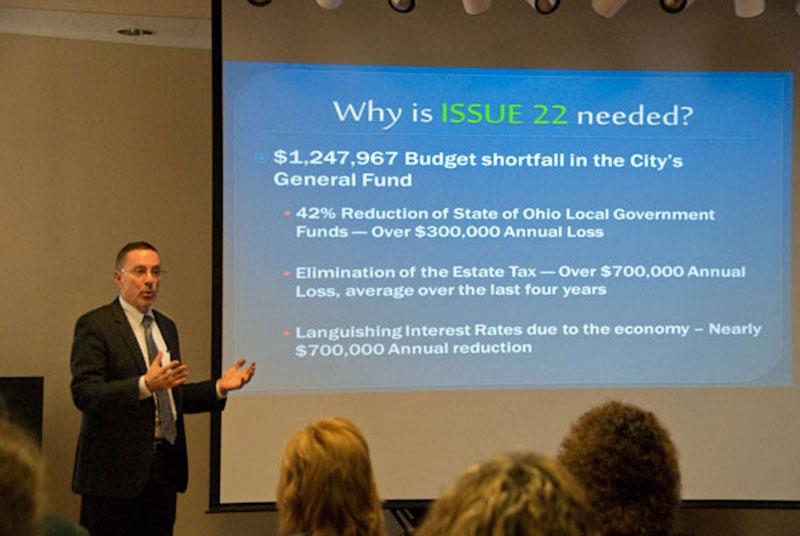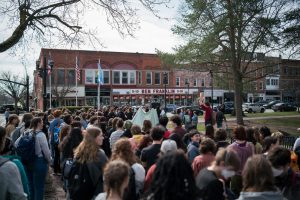Local Leaders Deliver “State of the City” Address
City Manager Eric Norenberg addresses employees regarding Issue 22, the income tax levy. Issue 22 is one of City Council’s many prescribed improvements for the future of Oberlin.
April 13, 2014
Oberlin City Manager Eric Norenberg and City Council President Scott Broadwell delivered a State of the City Address at the Oberlin Inn last week to an audience of Oberlin residents. The municipal leaders addressed the future of safety, economic development, tourism, sustainability and partnerships, infrastructure and the city as a model for social justice and race relations, along with many other future Oberlin developments.
“It gave us an opportunity to let the community know, the broader community, the College and city… where we’re at, some of the things we have been working on and a little bit in places where we want to go,” said Broadwell.
Norenberg and Broadwell laid out the city’s goals and priorities for the 2014-2015 city council term and beyond. One of the councilmen’s immediate concerns is ensuring the passage of Issue 22, which calls for a 0.6 percent income tax increase from 1.9 to 2.5 percent for the next 10 years. The proposed tax is expected to raise approx mately $1.8 million in revenue for the city’s general fund over a 10-year span.
“Issue 22 is critically important for the city to restore money that’s lost in recent years to state budget cuts and things like that,” Norenberg said. The city’s general fund currently has a $1.2 million budget shortfall.
Over the past three years, the state has made sweeping changes to local government funds — both reducing federal fund- ing by 42 percent and terminating the Estate Tax, a tax on the transfer of assets from deceased residents to their next of kin. Last year, Oberlin’s budget was cut by 10 percent, with similar cuts to this year’s budget.
According to Norenberg, the proposed tax increase has garnered some local resistance.
“We have heard from a few people attending presentations who feel the increase may be too much,” Norenberg said in an email to the Review. “However, I think everyone is supportive of the city and understands the need to maintain the quality of our services. In addition, the possibility of letting one or two of our other income tax levies expire in 2018 or 2019 — if revenues rebound and the city doesn’t take another financial hit — is reassuring.”
The general fund goes toward services such as the police and fire department, maintaining parks, and public works.
“I think the income tax component is a more appropriate way to do it as opposed to property tax,” said Oberlin Fire Chief Dennis Kirin, who is who is in charge of overseeing training and equipment replacement. “I think here … there’s not a good equity in property tax versus who takes services. … I think it’s an equitable way to do it. I think it’s an extreme necessity to get it passed. And believe me, it’s almost just trying to maintain the status quo.”
Broadwell echoed Kirin’s view of safety as a main precedent for the future of Oberlin.
“[Safety] doesn’t need to be a special priority this term because it’s always a priority. No matter how nice your town is, how well your streets are paved, how nice your recreation pro- grams are, how nice your downtown is, if it’s not safe to be in the community, it doesn’t [mat- ter],” Broadwell said.
The city is also working toward a number of long-term projects, such as the development of a 15-acre plot of land on the east side of Oberlin that the city acquired last year. By partnering with a developer, the city plans to use the field to build a housing development with mixed income rentals and single-family homes on the area of property formerly known as Green Acres. Construction likely won’t begin until 2016, but the current plans include a park, as well as additional green space.
Also on the list of priorities is a plan to reconstruct Oberlin into a model of social justice and race relations. In particular, the city counselors hope to promote diversity — particularly racial diversity — in the hiring of city employees.
“It’s just something in the general term to look at as we’re doing our hiring to see if we can further have … the population of the city reflected in the [faces] of the city employees, whether it be race minorities [or] women. … And not to say that we haven’t been aware, [but] just remaining aware of what we want to do and where we want to be,” Broadwell said.
Additionally, Oberlin plans to revive the recycling pick up program after six garbage and recycling trucks were destroyed in a fire in late February. Two new trucks were authorized for purchase on Monday, which will be used for commercial pickup. The city is looking into purchasing hybrid-hydraulic vehicles for further replacements. Vehicles with this type of engine have reduced carbon emissions, but cost at least $100,000 more than traditional garbage trucks. The city hopes to receive grants from several organizations, in- cluding the GreenEDGE Fund, to cover the additional costs.
The city also plans to implement a new method of individual recycling. Whereas Oberlin previously used a curbside separation system, each residence will soon have a single recycling container where glass, metal and cardboard can all be dis- posed of together.
Many of the city’s initiatives are ongoing. As always, the city hopes to nurture economic development and tourism. There are a variety of projects in the works, such as the Oberlin Underground Railroad Center, which the city hopes will bring additional business to down- town Oberlin. Broadwell is particularly excited about Oberlin’s nomination as a finalist for hosting the 2015–17 National Folk Festival, a three-day festival that would bring over 40,000 visitors.
Maintaining mutually beneficial relations with the College is also a priority, according to the city counselors. While this is a general goal, the city hopes to preserve an open dialogue with the College through collaborative ventures such as the Oberlin Project and the down- town parking study.
“We always want to have good relations with the College. … The College and town [were] founded at the same time in 1833, and we’re so intertwined,” Broadwell said.
Other plans and priorities discussed in the presentation include the completion of the downtown renovation, preparing for the repaving of State Route 58 and 511 this summer and expanding recreational programs.


























